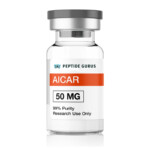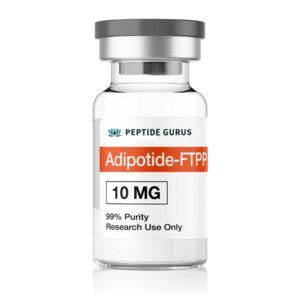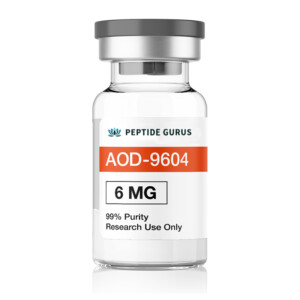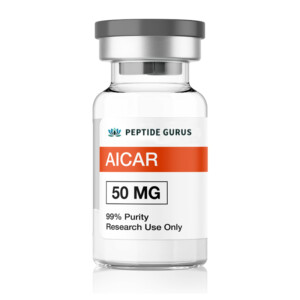What Is AICAR?
AICAR, short for 5-aminoimidazole-4-carboxamide ribonucleoside, is short peptide that plays a role in energy homeostasis and a number of metabolic pathways. AICAR plays a role in the regulation of insulin receptors and how muscle cells function with regards to insulin. AICAR is under active investigation for its cancer-fighting properties and for its ability to protect heart/cardiovascular tissue. AICAR is an AMP kinase (AMPK) activator.
AICAR is the activated form of naturally occurring acadesine, which is currently used in the treatment of acute lymphblastic leukemia. Research shows that acadesine, like AICAR, has anti-cancer properties. It has also been found to play a role in inhibiting platelet function and thus in the prevention of the early stages of blood clotting.
AICAR Structure
Fuente: PubChem
Secuencia: 5-aminoimidazol-4-carboxamida ribonucleósido
Fórmula molecular: C9H15N4O8P
Peso molecular: 338.213 g/mol
PubChem CID: 65110
Número CAS: 3031-94-5
Sinónimos: AICA ribonucletotide, Z-nucleotide
AICAR Effects
AICAR and Insulin Resistance
Research in mice shows that AICAR, incluso en dosis bajas, reduces inflammation in adipose tissue. Inflammation in fat is associated with increased insulin resistance and reducing inflammation leads to improved glucose homeostasis and increased insulin sensitivity even without any changes in body weight. I appears that AICAR has several pathways though which it affects inflammation in adipose tissue, with at least one of those pathways involving SIRT1 and macrophages[1].
The impact of AICAR on adipose inflammation is not unexpected. AMPK has been found to attenuate inflammatory responses in metabolic disorders in both healthy and diabetic mice. In research in mice, AMPK activation, as is caused by AICAR, was found to improve insulin sensitivity, energy homeostasis, lipid metabolism, and inflammatory markers[].
Exercise increases the number of GLUT-4 insulin receptors that are present on the surface of muscle cells. It is one of the most effective means of boosting glucose uptake by muscle cells and effectively reduces both glucose levels and insulin resistance. It turns out that AICAR mimics the effects of exercise very precisely and that repeated administration of AICAR has effects similar to long-term exercise[3].
AICAR and Cancer Research
AMPK plays a complex role in the growth and metastasis of cancer, both slowing and accelerating the growth of tumors under varying circumstances. En general, research indicates that prolonged activation of the enzyme eventually leads to cancer cell death by slowing cancer cell metabolism and making cancer cells more susceptible to environmental insults. This has been demonstrated both in cell culture and in rats[4, pag. 5], [5]. Scientists are investigating the ability of AICAR to work in tandem with other chemotherapeutic agents to boost effectiveness. The thought is that AICAR might:
reduce side effects,
allow for lower dosing of chemotherapeutic drugs, y
improve outcomes in chemo-resistant tumors[6].

AICAR inhibits clonal growth of glioma (C6) and prostate cells.
Fuente: Journal of Biological Chemistry
Research in thyroid cancer cells indicates that AICAR may also operate by causing apoptosis (muerte celular programada). It appears that this activity is mediated through the induction of p21 accumulation and the eventual activation of caspase 3. The overall effect is inhibition of cancer cell proliferation and survival[7].

AMPK activators, like AICAR, influence a number of pathways that can impact cancer growth.
Fuente: PubMed
AICAR Anti-inflammatory Properties
AMPK activators have been shown to play an important role in inflammation at the cellular level. Research into metformin, a common and long-used diabetes medication, indicates that at least part of the reason the drug is effective is that it reduces inflammation and boosts the function of the pancreas. AICAR has a similar effects, playing a protective role in inflammatory conditions like acute lung injry, asthma, colitis, aterosclerosis, and hepatitis[8].
There is ongoing research into the use of AICAR to mediate the effects of auto-immune diseases and other inflammatory conditions. Por ejemplo, studies in mice indicate that ACIAR may be effective in reducing inflammation in colitis. It appears that AICAR acts as a central inhibitor of immune responses in this setting by reducing NF-kappaB activation in macrophages as well as TH1- and TH17-type cytokines[9].
AICAR Research and the Heart
Much of heart disease is related to inflammation. The ability to control inflammation could reduce the progression of vascular disease, including atherosclerosis. Research in rabbit models of atherosclerosis indicated that AICAR suppression vascular smooth muscle proliferation. This is not only an important component of cardiovascular disease, but is also one of the reasons that cardiac stents fail over time. Controlling vascular inflammation could reduce both short-term and long-term complications of stent placement without the need for drugs that increase the risk of bleeding[10].
Research also suggests that AMPK activation can suppression certain immune responses that lead to atherosclerosis. The buildup of LDL, often referred to as “bad cholesterol,” leads to macrophage proliferation. This process is integral to the formation of plaques that can eventually lead to heart attack[11]. Anything that can mitigate this proliferation has the potential to reduce heart disease and even heart attack prevalence.
AICAR Research and Fertility
A great deal of AICAR research has revolved around the ability of the peptide to improve sperm motility, energy metabolism, and fertilizing ability. Research in both cats, goats, and chickens indicates that AMPK activators like AICAR can improve sperm motility by improving energy metabolism[12]. It appears that AICAR regulates the activity of energetic enzymes in spermatozoa and therefore impacts overall fertilizing ability[13].
AICAR exhibits minimal side effects, baja biodisponibilidad oral y excelente subcutánea en ratones. La dosis por kg en ratones no se aplica a los humanos. AICAR for sale at PEPTIDE GURUS is limited to educational and scientific research only, no apto para consumo humano. Only buy AICAR if you are a licensed researcher.
Autor del artículo
La literatura anterior fue investigada, editado y organizado por el Dr.. logan, MARYLAND. Dr. Logan holds a doctorate degree from Case Western Reserve University School of Medicine and a B.S. en biología molecular.
Autor de revista científica
Spencer Gaskin, M.D., Doctor. is an American Board of Internal Medicine certified cardiologist and medical practitioner. His expertise of Internal medicine and cardiology sources from UT Southwestern Cardiology, Washington University Interventional Cardiology, and the Mid America Heart Institute. Dr. Gaskin led a study that examined the prevention of Postischemic Leukocyte Rolling and Adhesion via preconditioning with AICAR.
Spencer Gaskin, M.D., Doctor. is being referenced as one of the leading scientists involved in the research and development of AICAR. De ninguna manera este médico/científico respalda o defiende la compra, venta, o uso de este producto por cualquier motivo. No hay afiliación o relación., implícito o no, entre PEPTIDE GURUS y este doctor. El propósito de citar al médico es reconocer, reconocer, y damos crédito a los exhaustivos esfuerzos de investigación y desarrollo realizados por los científicos que estudian este péptido.. Dr. Gaskin is listed in [14] bajo las citas referenciadas.
Citas referenciadas
z. Yang et al., “The full capacity of AICAR to reduce obesity-induced inflammation and insulin resistance requires myeloid SIRT1,” PloS One, volumen. 7, No. 11, pag. e49935, 2012.
k. Pan et al., “AMPK activation attenuates inflammatory response to reduce ambient PM2.5-induced metabolic disorders in healthy and diabetic mice,” Ecotoxicol. Reinar. Saf., volumen. 179, páginas. 290–300, Sep. 2019.
norte. Jessen, R. Pold, mi. S. Buhl, l. S. Jensen, oh. Schmitz, y S. lund, “Effects of AICAR and exercise on insulin-stimulated glucose uptake, signaling, and GLUT-4 content in rat muscles," J.. Appl. fisiol. Bethesda Md 1985, volumen. 94, No. 4, páginas. 1373–1379, Abr. 2003.
j. Zhuge, “Overexpression of CYP2E1 induces HepG2 cells death by the AMP kinase activator 5’-aminoimidazole-4-carboxamide-1-beta-D-ribofuranoside (AICAR),” Cell Biol. Toxico., volumen. 25, No. 3, páginas. 253–263, Jun. 2009.
R. Rattan, S. Giri, A. k. Singh, y yo. Singh, “5-Aminoimidazole-4-carboxamide-1-beta-D-ribofuranoside inhibits cancer cell proliferation in vitro and in vivo via AMP-activated protein kinase," J.. biol. Química., volumen. 280, No. 47, páginas. 39582–39593, Nov. 2005.
METRO. METRO. h. Yung, h. Y. S. Ngan, y D. W.. Chan, “Targeting AMPK signaling in combating ovarian cancers: opportunities and challenges,” Acta Biochim. Biofísica. Sin., volumen. 48, No. 4, páginas. 301–317, Abr. 2016.
W.. GRAMO. kim, H.-J. Choi, t. Y. kim, Y. k. Shong, y W. B. kim, “The effect of 5-aminoimidazole-4-carboxamide-ribonucleoside was mediated by p38 mitogen activated protein kinase signaling pathway in FRO thyroid cancer cells,"Coreano J. Intern. Con., volumen. 29, No. 4, páginas. 474–481, Jul. 2014.
X.-W. Peng, H.-H. zhou, j. Dai, y l. zhang, “[Advances on the anti-inflammatory and protective effect of AMPK activators],” Sheng Li Xue Bao, volumen. 71, No. 2, páginas. 319–326, Abr. 2019.
A. Bai et al., “Novel anti-inflammatory action of 5-aminoimidazole-4-carboxamide ribonucleoside with protective effect in dextran sulfate sodium-induced acute and chronic colitis," J.. farmacología. Exp. Ahí., volumen. 333, No. 3, páginas. 717–725, Jun. 2010.
METRO. Igata et al., “Adenosine monophosphate-activated protein kinase suppresses vascular smooth muscle cell proliferation through the inhibition of cell cycle progression,”Circuito. Res., volumen. 97, No. 8, páginas. 837–844, Oct. 2005.
METRO. Sakai, S. Kobori, A. Miyazaki, y S. Horiuchi, “Macrophage proliferation in atherosclerosis,”. opinar. Lipidol., volumen. 11, No. 5, páginas. 503–509, Oct. 2000.
PAG. Thuwanut, PAG. Comizzoli, k. Pruksananonda, k. Chatdarong, y norte. Songsasen, “Activation of adenosine monophosphate-activated protein kinase (AMPK) enhances energy metabolism, motility, and fertilizing ability of cryopreserved spermatozoa in domestic cat model," J.. Assist. reproducir. Gineta., Puede 2019.
z. Zhu et al., “5’-AMP-Activated Protein Kinase Regulates Goat Sperm Functions via Energy Metabolism In Vitro," Celúla. fisiol. bioquímica. En t. j. Exp. Celúla. fisiol. bioquímica. Farmacéutico., volumen. 47, No. 6, páginas. 2420–2431, 2018.
F. Spencer Gaskin, Kazuhiro Kamada, Mozow Yusof, William Durante, Garrett Gross & Ronald J. Korthuis (2009) AICAR Preconditioning Prevents Postischemic Leukocyte Rolling and Adhesion: Role of KATP Channels and Heme Oxygenase, Microcirculation, 16:2, 167-176, DOI: 10.1080/10739680802355897
TODOS LOS ARTÍCULOS E INFORMACIÓN DE PRODUCTOS PROPORCIONADOS EN ESTE SITIO WEB SON SÓLO PARA FINES INFORMATIVOS Y EDUCATIVOS.
Los productos ofrecidos en este sitio web se proporcionan únicamente para estudios in vitro.. Estudios in vitro (latín: en cristal) se realizan fuera del cuerpo. Estos productos no son medicamentos ni fármacos y no han sido aprobados por la FDA para prevenir, tratar o curar cualquier condición médica, dolencia o enfermedad. La introducción corporal de cualquier tipo en personas o animales está estrictamente prohibida por la ley..






